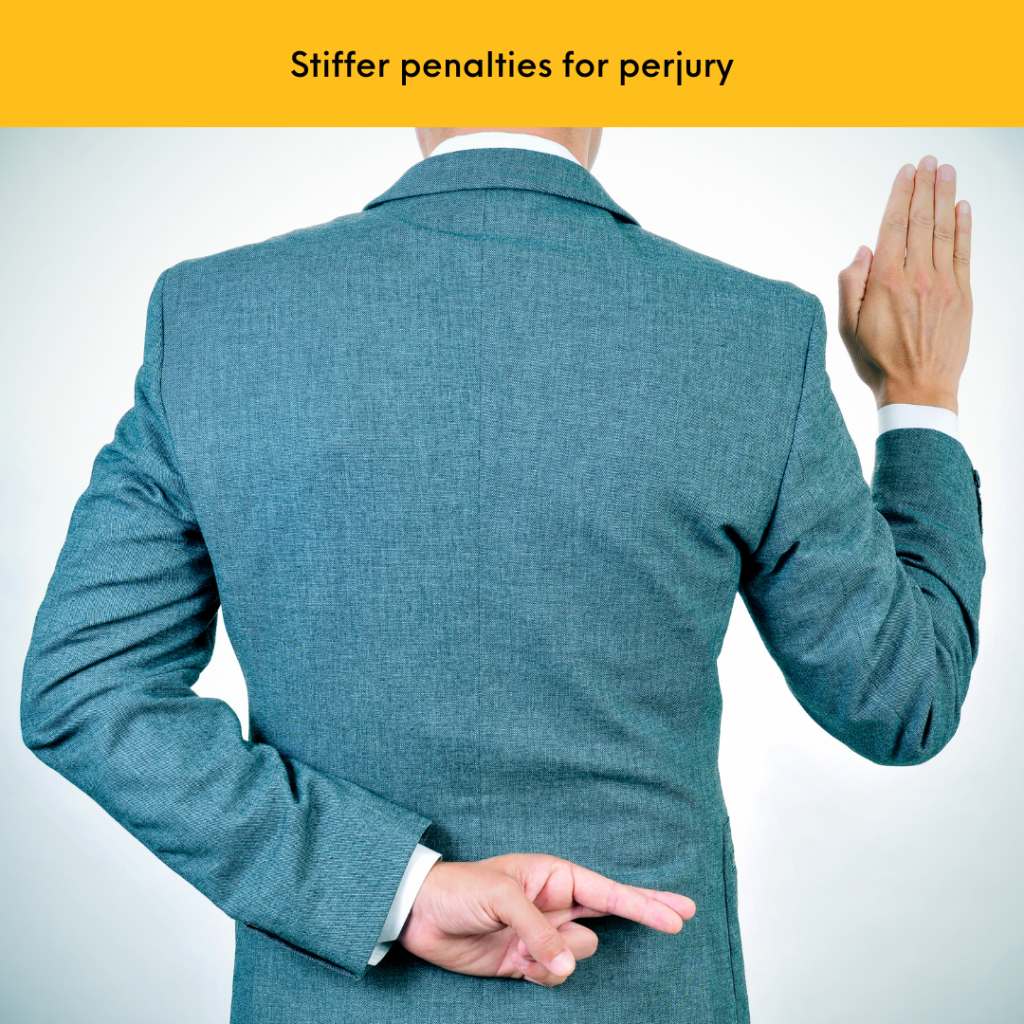
Published 21 August 2023, The Daily Tribune
Lying is bad. Lying under oath may even be criminal. If a person deliberately and willfully makes untruthful statements under oath or makes an affidavit upon any material matter required by law, he may be criminally charged with perjury under Article 183 of the Revised Penal Code, as amended.
Previously, perjury was penalized with a light penalty of arresto mayor in its maximum period (or a period of four months and one day to six months) to prision correccional in its minimum period (or a period of six months and one day to two years and four months).
In October 2021, then President Rodrigo Duterte signed into law Republic Act 11594, amending Article 183, and thereby increasing the penalty for perjury.
With the amendment of the Revised Penal Code by Republic Act 11594, perjury is now punishable by a penalty of prision mayor in its minimum period (six years and one day to eight years) to its medium period (eight years and one day to 10 years). If the offender is a public officer or employee, the penalty shall be imposed in its maximum period, or 10 years and one day to 12 years.
In addition, the person found guilty of perjury may be made liable to pay a fine of up to P1 million and may be perpetually disqualified from holding any appointive or elective position in government or in any of its agencies, entities, or instrumentalities.
With the harsher and stiffer prescribed penalties for perjury, let us revisit how this crime is committed.
Under our established jurisprudence, for perjury to exist, the following elements must be present, namely: (a) there must be a statement made under oath or an affidavit was executed upon a material matter; (b) the statement or affidavit was made before a competent officer, authorized to receive and administer an oath; (c) in that statement or affidavit, there was a willful and deliberate assertion of a falsehood; and (d) the sworn statement or affidavit containing the falsity is required by law or made for a legal purpose. (Villanueva v Secretary of Justice, G.R. 162187, 18 November 2005)
On the first element, a material matter is defined as the main fact that is the subject of the inquiry or any fact or circumstance which tends to prove that fact; or any fact or circumstance which tends to corroborate or strengthen the testimony relative to the subject of inquiry, or which legitimately affects the credit of any witness who testifies. (Masangkay v People, G.R. 164443, 18 June 2010)
This means that not all falsehoods committed under oath may be punishable by perjury. The falsified matter must be a material matter. For instance, in an intra-corporate case where the directorship of the company is contested, the corporate secretary who filed a General Information Sheet stating that a different set of directors were elected — when in truth they were not — may be held liable for perjury because the election of the directors is a material fact in the intra-corporate case. Meanwhile, the falsity of the indicated telephone number of the corporation in the GIS may not be considered a material matter.
As to the second element of subscribing the statement or affidavit under oath before a competent officer, this usually pertains to the swearing of a statement before a notary public or for instance, in criminal cases, before a public prosecutor.
Next, as to the element of willful and deliberate falsehood, this means that there is a corrupt and intentional perversion of truth. As explained in the case of Saulo v People of the Philippines (G.R. 242900, 8 June 2020), “willful” means intentional. There is evil intent and legal malice on the part of the accused, that is, there is consciousness that the alleged perjurious statement is false with the intent that it should be received as a statement of what was true in fact. “Deliberate”, on the other hand, means it was meditated. The accused must know his statement to be false or is consciously ignorant of its truth.
Thus, perjury cannot be willful where the oath is according to belief or conviction as to its truth. A false statement of a belief is not perjury. Bona fide belief in the truth of a statement is an adequate defense. A false statement which is obviously the result of an honest mistake is not perjury. (Villanueva v. Secretary of Justice, G.R. 162187, 18 November 2005).
For example, one’s testimony under oath that he or she saw a particular person at the scene of the crime, when in fact, the particular person he or she saw is a twin of that particular person, there is no willful and deliberate falsehood.
Finally, as to the element that the affidavit or sworn statement is required by law or for a legal purpose, this is satisfied when the particular affidavit or sworn statement is submitted in a legal proceeding or is required to be submitted by law. Going back to our first example, a General Information Sheet is required by the Revised Corporation Code (Section 177) to be submitted to the Securities and Exchange Commission. Accordingly, perjury may attach in the case of submission of a GIS with falsified material entries.
Charged with the foregoing knowledge, extreme caution must be made in executing sworn statements or affidavits, or in making statements under oath. More importantly, our sworn declarations must always correspond with the truth or our bona fide belief of the truth. Note that perjury is an obstruction of justice; its perpetration may affect the earnest concerns of the parties before a tribunal. (Villanueva v Secretary of Justice, G.R. 162187, 18 November 2005)
For more of Dean Nilo Divina’s legal tidbits, please visit www.divinalaw.com. For comments and questions, please send an email to cabdo@divinalaw.com.

